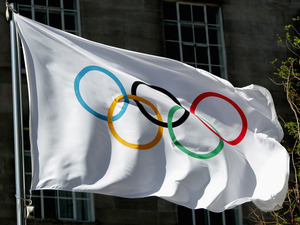
The Olympic flag will fly again in 2014 and 2016, but where U.S. viewers will find the games on television is up for bids this week.
The Olympic flag will fly again in 2014 and 2016, but where U.S. viewers will find the games on television is up for bids this week.
Bidding on TV broadcast rights for the 2014 and 2016 Olympics will take place Tuesday in Lausanne, Switzerland, and there seems to be a decent chance that NBC ? working without longtime NBC sports chief Dick Ebersol, who recently resigned after failing to reach terms with the leadership that came in when Comcast took over ? won't be the winner, for the first time since CBS carried the Winter Games in 1998.
As this piece in Ad Week explains today, the most likely fit for the 2014 and 2016 games might be the ESPN/ABC/Disney operation, though Fox is also in the mix. According to a report in yesterday's New York Times, both Fox and ESPN have vowed to end one of NBC's most complained-about Olympics practices: the tape delay.
?During the 2010 Winter Olympics, we discussed the problems that tape delays present in an instant-communication world: NBC would sit on the tape of, say, a ski race for six or eight hours in order to air it in prime time, during which time anyone who wanted to see it with any kind of suspense in place had to avoid any media outlets that might report it. Meanwhile, any media outlets that wanted to report the results ? which are, after all, a legitimate news event ? had to step carefully with their own audiences essentially for the benefit of NBC's coverage, meaning one network's decision not to air something wound up creating big headaches for everyone else.
There are a number of reasons to be optimistic about, in particular, ESPN covering the Olympics. And make no mistake: if ABC/Disney/ESPN gets the bid, it will be branded as ESPN coverage, even when it's on ABC stations. As is explained in the new brick-like book about ESPN, Those Guys Have All The Fun, it didn't take long after ABC got hold of ESPN for the existing ABC Sports brand to essentially be snuffed out.
First, a sports brand is a better fit for the Olympics than an entertainment brand. Yes, NBC has sports, but the tape delays seemed to betray a prime-time-focused strategy that viewed sports as more similar to other prime-time shows than to other sports events (which no one would dream of not airing live).
Second, one of the key moments in ESPN's history was its early-rounds coverage of the NCAA basketball tournament. That coverage included moving around to a lot of different games depending on what was most interesting ? something not everybody was on board with at the time. That kind of "cover lots of things live and go to whatever's most compelling," particularly if it's complemented by multiple channels that provide fuller coverage of specific events for people who want that instead, could certainly be useful.
Finally, there's something to be said for disrupting what people have become accustomed to. Bob Costas doesn't actually have to cover the Olympics from a big chair by a fireplace ? there are potentially lots of ways you could approach Olympic coverage. Similarly, the mix of smooshy athlete profiles and actual sports is a programming decision, not a cultural imperative.
ESPN is not just a live broadcaster plus SportsCenter; it's also been making pushes into documentary storytelling, first with SportsCentury and more recently with the often outstanding 30 For 30 series. They can certainly handle the tendency of Olympic stories to turn into sweeping narratives.
The bidding could still go in a variety of different ways on Tuesday, but if a move to another network means that people won't be expected to watch headline-making sports events (1) not live and (2) at different times depending on what time zone they live in, it could be a very positive development.
tampa bay lightning blue book jim morrison grease chris colfer air china kung fu panda 2
No comments:
Post a Comment
Note: Only a member of this blog may post a comment.